【人教版高一英语】必修三unit1_教案
人教版英语必修三Unit 1(Reading)教案.docx

Festivals around the world reading长子县第三中学吴月玲教材分析:本单元是人教版高一英语必修3第1单元,它以“节日”为话题,介绍古今中外节日的种类、由来、意义以及人们的庆祝方式和习俗。
本单元的学习,要使学生不但对我国的节日有进一步的了解,而且对外国的节日也有所了解,进而使学生在多样的东西方节日文化比较中发现节日文化的共性和民族独特性,达到丰富文化背景、增加跨国文化知识的目的;要使学生复习和巩固运用请求和感谢的表达方法,掌握情态动词的用法;并尝试根据阅读的文章写一个不同的结局,能表达自己的观点和想法。
Reading教学设计是本单元第二课时。
学情分析:教学对象是高一学生,他们已有一定的获取处理信息、分析解决问题的能力,因此我注重提高学生用英语进行思维和表达的能力。
由于本课正好是在学生过完春节之后回来上的,学生的学习兴趣很浓,可通过任务型课堂活动让学生对课文内容阐述见解。
由于学生的水平参差不齐,可设计了不同的教学任务,让各个层次的学生在课堂上都能有所收获。
Reading教学设计教学目标: 1.Get the students to master the following words and expressions: arrival , national , gain , independence , gather , agricultural In memory of , dress up , day and night ,look forward to , as though ,have fun with2.Enable the students to know the earlist festivals with reasons for them.3.Master some English expressions and phrases about festivals. 4.Enable the students to talk about festivals in English. 教学重点: 1.Train the student s’ reading ability. 2.Learn and master some important words and phrases in this period.教学难点: 1.Improve the students’ reading skill. 2.How to talk about all kinds of festivals in English.教学方法: 1.Skimming to get the general idea of the text. 2.Scanning to get detailed information and understand the language points. 3.Task-based methods to get the students to talk about all kinds of festivals.教具准备: A computer ,a projector and a tape recorder.教学过程:StepⅠGreetings: Greet the whole class as usual.Step ⅡRevision and lead—in.1、Review the new words of this part .2、Ask the students to name some festivals in English.3、I show some pictures on Chinese and Western Festivals (Spring Festival, the Dragon Boat Festival, the Mid—Autumn Festival, Christmas ,Thanksgiving Day, Halloween )on the screen to lead out the topic “ Festivals and celebrations ”.I ask the students to talk about the festivals in pairs a few minutes . Then I will ask them these questions : can you say what these festivals are ? When do they take place? What people do at that time? What do people eat on these festivals ? (展示图片并根据图片内容进行提问,既复习旧课内容,也激发学生兴趣,为进入本文的学习做好铺垫。
人教版高一英语必修三Unit1Festivals around the world教案设计
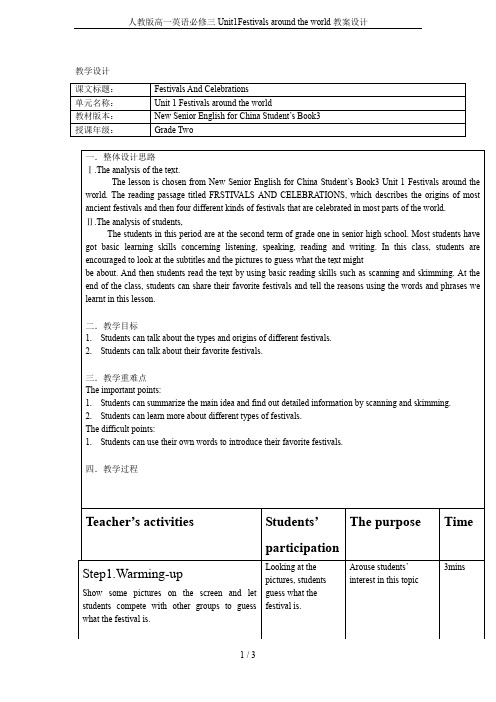
教学设计
课文标题: 单元名称: 教材版本: 授课年级:
Festivals And Celebrations Unit 1 Festivals around the world New Senior English for China Student’s Book3 Grade Two
The students in this period are at the second term of grade one in senior high school. Most students have got basic learning skills concerning listening, speaking, reading and writing. In this class, students are encouraged to look at the subtitles and the pictures to guess what the text might be about. And then students read the text by using basic reading skills such as scanning and skimming. At the end of the class, students can share their favorite festivals and tell the reasons using the words and phrases we learnt in this lesson.
3/3
5mins
2/3
人教版高一英语必修三 Unit1Festivals around the world 教案设计
人教课标版高一英语必修3第一单元教案1

Unit 1 Festivals around the worldThe first periodStep I Leading inT: Hello, everybody! Welcome back to school! Did you have a good time in your winter holidays? Ss. Y es. Of course!T: When did you feel most happy and excited?Ss: At the Spring Festival. T: Who can tell us why? Any volunteers?S1: Because it is the most important festival in our country.S2: Because I got a lot of lucky money from my parents.S3: Because I needn’t study at festivals and there was a lot of delicious food to eat.How great.S4: Because I met my cousins and friends who I hadn’t seen for a long time.T. V ery food! I am glad to hear that. Today we will talk about festivals, which are meant to celebrate important events. Please think about some other festivals.Can you name just a few?Ss: New year, Yuan xiao festival…:T: Quite right. That’s called the Lantern’s Festival. How about some other festivals?Ss: The Army Day, International Labour’s Day, National Day, Tomb Sweeping Festival, Dragon Boat Festival, Mid-autumn Day…T: Y ou have done a good job, boys and girls! .Step ⅡW arming –up Festivals are meant to celebrate important events. Different countries have different festivals. Work in groups and lost five Chinese festivals that you know. Discuss when they take place, what they celebrate and one thing that people do at that time. The first one is given to you as an example.Step ⅢPre- reading Discuss in groups of four1.What’s your favourite holiday of the year? Why?2.What festivals or celebrations do you enjoy in your city or town? Do you likespending festivals with your family or with friends? What part of a festival do you like best---the music, the things to see, the visits or the food?Step ⅣAssignment 1 Consolidation2Listening to the material again after class to be familiar with it.3Homework: Collect as much information about festivals as possible.The second period ReadingStep ⅠRevision1.Greetings.2.Review the new words of this part.3.Check the students’ homework---festivalsStep ⅡReading 1.ScanningT: Open your books and turn to page one. I’d like you to do the scanning. Read the text quickly and accurately to get the main idea and answer the 6 questions on Page3.( Ask the student to look through the questions and then read the text silently.)( Four minutes later, check the answers with the whole class. Show the suggested answers on the screen.)2.Intensive reading( Allow the students to read aloud and carefully this time to understand the main ideas of each paragraph and the important details)T: Read the text loudly for a second time and them try to tell if these sentences aredo Exercise 2 on Page 3.( Let the students have enough time to read the passage carefully and discuss the chart with their partners. Encourage them to expand their answers according to their own experiences.)4.Explanation(In this part try to help the students analyse the difficult, long and complex sentences and guess the meaning of the new words; ask them to deal with the language points in the context.)Step ⅢListeningT: Now I will play the tape for you. Y ou can just listen with your books closed or look at your books or read in a low voice together with the tape. It’s up to you. After listening, please write down three things that most festivals seem to ha ve in common..The third period Learning about languageStep ⅠGreeting and Revision( Ask some students to retell the text we learned .)StepⅡ. Practicing the useful words and expressionsT: As we know, there are two important kinds of verbs---transitive verbs and intransitive verbs. But many intransitive verbs have the structure “verb+preposition+objects ” Can you give me some examples?Ss: Sure. Such as look at the picture, hear from my friends, listen to the radio and so on.T: Ok. Now turn to page 4, Ex. 4. Y ou are to make some sentences of your own, using the words given.S1. I’m looking forward to hearing form my friendS2: We are talking about verbs.S3: Would you like to talk with me?S4: Who can think of an effective solution to the problem?S5: Please think about my proposal.Step ⅢUseful StructuresT: Let’s come to the next part. This part is about modal verbs. Y ou are to read the sentences in Ex. 1 and then to find out and write down different sentences with modal verbs form the reading passage and try to explain their meanings. If you have any difficulty in understanding them you can refer to Grammar in Pages 92---94Step ⅣSumming up and home workT: Boys and girls, today we have practiced useful words and phrases of this unit and the usage of modal verbs. I think it is not easy for you to master them, after class you should review them.Homework1.Practice of WBP42EX.1,2,3.2.Please find out10 sentences with modal verbs, and try to get their meanings.The fourth period ListeningStep ⅠRevisionAfter checking the WB Ex. 1,2,3 the teacher ask the students to give examples about modal verbs and try to explain them.Step ⅡW arming upT: By the way, what’s the topic of this unit?Ss: Festivals around the world.T: Would you like to know something more about festivals around the world? Ss: Of course.T: Now I will show you several pictures. What’s the festival called?Ss: Carnival. T: Y es. This class we will listen to a dialogue about carnivals. First look through the four questions in listening part to find out the listening points. Step ⅢListeningT: I will play the tape for you twice. Please listen carefully and pay much attention to the important points. For the first time you are to make notes beside the questions. For the second time, you should write down the answers and then check them with your partners.( It’s important to encourage the students to adapt their presentknowledge any skill to a variety of situations wherever they can.Make sure to allow various expressions of the answers. Do not demand the same words form all students.)Step ⅣSpeakingThis part is intended to give the students the opportunity to practice a telephone conversation using the functional items for requests and thanks. Thepolite form of English are important and should be practiced in avariety of situations.Step ⅤListening taskT: There are about 10 minutes left. Let’s come to listening task. Turn to page 43 and look at the pictures. They have something in common. Can you find it out? Ss: They are all about festivals bout the dead.T: That’s right. I will play the tape for you. For the first time you should try to write down the name of the country where the festival are held. For the next two times you should do Ex2. Y ou can make a brief note first and then complete the chart, according to which you can make a report.The fifth period Extensive readingStep ⅠRevisionCheck homeworkStep ⅡReading (1)T: As we know, there are all kinds of festivals around the world. We have talked about two Chinese festivals for the dead. Today we are going ti read a sad story, which is to introduce a cross cultural view of lovers’ festival—Qi Qiao and V alentine’s Day. Now please read it quickly and find out the sentence below areT: I think you have got the general idea of the passage. Now please read the passage once more and answer the questions on Page 8.Step ⅢDiscussion and writingT: That’s for the reading part of the passage. Please think about the ending of the story. Are you satisfied with the ending? Different people have different opinions to a matter. Now any one of you have an opportunity to make up an ending to the story. Please engage imaginatively in the story and use your own ideas. Try to use the vocabulary and structures you have learned of you like.。
【人教高一英语】必修三 unit 1 教案
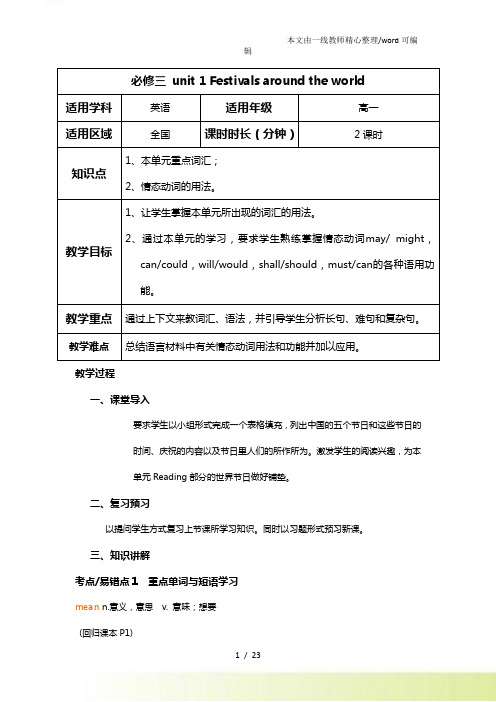
必修三unit 1 Festivals around the world 适用学科英语适用年级高一适用区域全国课时时长(分钟)2课时知识点1、本单元重点词汇;2、情态动词的用法。
教学目标1、让学生掌握本单元所出现的词汇的用法。
2、通过本单元的学习,要求学生熟练掌握情态动词may/ might,can/could,will/would,shall/should,must/can的各种语用功能。
教学重点通过上下文来教词汇、语法,并引导学生分析长句、难句和复杂句。
教学难点总结语言材料中有关情态动词用法和功能并加以应用。
教学过程一、课堂导入要求学生以小组形式完成一个表格填充,列出中国的五个节日和这些节日的时间、庆祝的内容以及节日里人们的所作所为。
激发学生的阅读兴趣,为本单元Reading部分的世界节日做好铺垫。
二、复习预习以提问学生方式复习上节课所学习知识。
同时以习题形式预习新课。
三、知识讲解考点/易错点1 重点单词与短语学习mean n.意义,意思v. 意味;想要(回归课本P1)Festivals are meant to celebrate important times of year.[归纳拓展]mean to do 打算做某事be meant to do 被要求做…mean doing 意味着….eg. I never meant him to work for us.Passing the entrance examination means being admitted into college.take place发生(回归课本P1)Discuss when they take place, what they celebrate and what people do at that time. [归纳拓展] take place/happen/occur/break out/come about(1)take place 其“发生”是按意图或计划进行,无偶然性,无被动语态。
【——人教版高一英语】必修三unit1教案
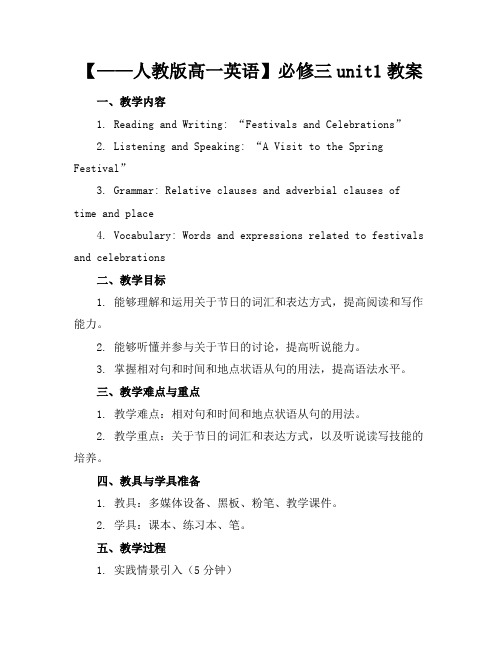
【——人教版高一英语】必修三unit1教案一、教学内容1. Reading and Writing: “Festivals and Celebrations”2. Listening and Speaking: “A Visit to the Spring Festival”3. Grammar: Relative clauses and adverbial clauses of time and place4. Vocabulary: Words and expressions related to festivals and celebrations二、教学目标1. 能够理解和运用关于节日的词汇和表达方式,提高阅读和写作能力。
2. 能够听懂并参与关于节日的讨论,提高听说能力。
3. 掌握相对句和时间和地点状语从句的用法,提高语法水平。
三、教学难点与重点1. 教学难点:相对句和时间和地点状语从句的用法。
2. 教学重点:关于节日的词汇和表达方式,以及听说读写技能的培养。
四、教具与学具准备1. 教具:多媒体设备、黑板、粉笔、教学课件。
2. 学具:课本、练习本、笔。
五、教学过程1. 实践情景引入(5分钟)利用多媒体展示世界各地节日的图片,引导学生谈论他们所了解的节日,激发兴趣。
2. 阅读与写作(20分钟)1)学生阅读“Festivals and Celebrations”部分,理解文章大意。
2)教师讲解关于节日的词汇和表达方式,并指导学生进行写作练习。
3. 听力与口语(20分钟)1)学生听“Spring Festival”的对话,回答相关问题。
2)教师组织学生进行小组讨论,分享他们最喜欢的节日。
4. 语法讲解(15分钟)1)教师讲解相对句和时间和地点状语从句的用法。
2)学生进行语法练习,巩固所学知识。
5. 随堂练习(10分钟)学生完成课堂练习,检测对本节课知识点的掌握情况。
六、板书设计1. 关于节日的词汇和表达方式2. 相对句和时间和地点状语从句的用法3. 课堂练习答案七、作业设计1. 作业题目:1)根据课堂所学,写一篇关于你最喜欢的节日的短文。
人教版 高中英语必修第三册 Unit 1 教案

必修三第一单元Why do we celebrate festivals?一、文本分析这是一篇说明文,从不同的侧面对节日进行说明。
第一段首先介绍节日的起源有季节、宗教、著名人物、重要事件,接着介绍节日的共性特点:分享快乐、感激、爱、和平等。
第二段举例说明全世界共同庆祝的节日丰收节的庆祝时间、原因和主要活动,同时举例说明古代埃及、现代欧洲和中国庆祝丰收节的情况。
第三段介绍习俗在节日形成中扮演着重要角色,但随着社会的发展,一些习俗逐渐消失,同时也产生些新的习俗,以中国春节为环保而禁止燃放鞭炮和万圣节变成了孩子的娱乐节日为例说明。
第四段介绍节日商业化现象。
最后一段说明节日的重要性和意义。
从节日的起源、共性特点、发展、重要性和意义等方面介绍节日,理解节日的文化内涵,比较节日的异同,让学生了解不同民族文化习俗与传统节日,拓宽国际视野,增强祖国意识和跨文化交际能力。
二、设计理念“问题链·导学”模式是以“为什么要庆祝庆祝节日?”这一问题为中心开展教学。
通过节日情境创设,把学生引导到提出问题、分析问题、感悟问题的活动中来。
让学生基于节日主题语境,通过学习理解、迁移创新等体现综合性、关联性等特点的英语学习活动,围绕标题为什么要庆祝节日展开,提炼庆祝原因,在分析问题和解决问题过程中,促进自身语言知识学习、语言技能发展、文化内涵理解、多元思维发展。
三、本堂课特色1.创设节日情境,激发阅读动机;2.围绕教学目标,借力思维导图,理清语篇思路,使文本信息结构化;3.以问题链为支架,深度阅读,融入语言,优化思维发展,探讨庆祝节日的原因;4.回归标题,针对“festival”首字母,回归课文,再次提炼庆祝节日的意义,升华主题。
四、教学目标1.获取段落大意,梳理节日的起源、共性特点、发展等信息;2.描述中外节日异同,理解不同节日的重要性;3.分析和总结庆祝节日的原因;4.写一篇介绍清明节的应用文。
五、教学步骤Step1:学习理解类活动1. 围绕主题创设情境,铺垫语言以临近的清明节为导入,Why do we celebrate Tomb Sweeping Day? How do we celebrate it?Step2:概括、梳理、整合信息1. 寻找段落大意总结阅读技巧。
人教版英语必修三Unit 1(Using language:A Sad love Story)教案
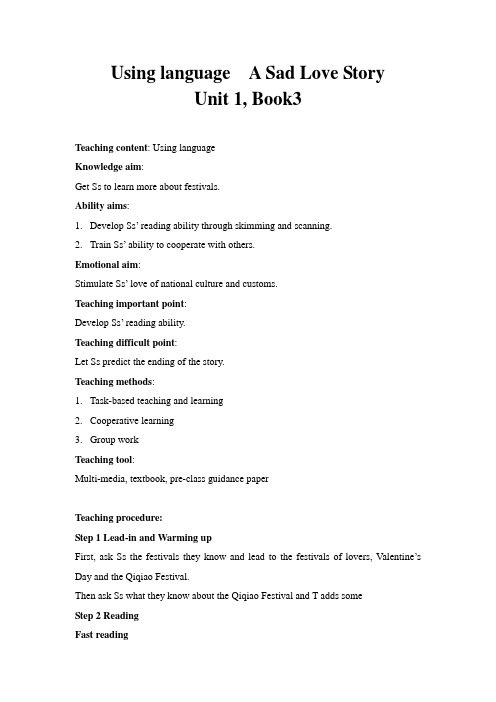
Using language A Sad Love StoryUnit 1, Book3Teaching content: Using languageKnowledge aim:Get Ss to learn more about festivals.Ability aims:1.Develop Ss’ reading ability through skimming and scanning.2.Train Ss’ ability to cooperate with others.Emotional aim:Stimulate Ss’ love of national culture and customs.Teaching important point:Develop Ss’ reading ability.Teaching difficult point:Let Ss predict the ending of the story.Teaching methods:1.Task-based teaching and learning2.Cooperative learning3.Group workTeaching tool:Multi-media, textbook, pre-class guidance paperTeaching procedure:Step 1 Lead-in and Warming upFirst, ask Ss the festivals they know and lead to the festivals of lovers, Valentine’s Day and the Qiqiao Festival.Then ask Ss what they know about the Qiqiao Festival and T adds someStep 2 ReadingFast readingLet Ss read Para1 and get the general plot of the story.main characters_________________time _____________________place________________What happened?Li Fang waited with roses and chocolates for Hu Jin. Hu Jin didn’t _____ ___ on time as she had said. Li Fang drowned his sadness in _____.After two min, check together.Careful readingGive Ss seven min to read the text and finish the following tasks:Ⅰ.Finish the sentences.1. Hu Jin didn’t turn up A. but she waited in a tea shop.2. The Goddess got very angry B. it means that Zhinv is weeping3. If it is raining on Qiqiao Festival, C. so Li Fang lost heart and drowned hissadness in coffee.4. Hu Jin kept her word D. because he had no gifts for Hu Jin andthought she would not forgive him.5. At the end of the story, Li Fang was worriedE. Because her most lovely granddaughtergot married to a human secretly.Ⅱ.Answer the following questions:1. Who is Hu Jin?2. What was Li Fang afraid that Hu Jin was doing?3. Why did people want the weather to be fine on Qiqiao Festival?4. What is the reason why Li Fang did not meet Hu Jin on time?Ⅲ. True or false1.Hu Jin wasn’t able to meet Li Fang at 7:00.2. If it is raining on Qiqiao Festival, it means that Zhinv is weeping and the couple will be able to meet.3. Because her granddaughter got married to a human, the Goddess got very angry.4. Li Fang thought he could get married to Hu Jin, just like Niulang and Zhinv.5. Li Fang didn’t meet Hu Jin at last.Check individually. For true or false, if it is wrong, let Ss correct it.Step 3 ConclusionLet Ss listen to the tape and fill in blanks about the summary of the reading.It was on _______ Day. Li Fang waited his _______, Hu Jin, at the coffee shop with ____ and _____, but she didn’t ___ ____. He was so heart-_____ that he felt like a ____. Drowning his sadness __ coffee, he thought the sad story about _____ and Zhinv on TV was what he needed. He thought they fell in love like Niulang and Zhinv and could get _____ like them, too. As he set ___ for home, he met Hu Jin. The truth was that Hu Jin was waiting in the ________. He felt worried, because he had thrown ____ her Valentine’s gifts.After checking, let Ss read the summary together.Step 4 DiscussionWork in four and discuss the following topic:What do you think will be the ending to the story of Li Fang?The spokesman of each group should report after discussion and T should give proper evaluation.Step 5 Assignment1.Try to retell the story.2.Finish related exercises.Self-reflection ( To be written after class immediately.)。
人教版高中英语必修三unit1教案
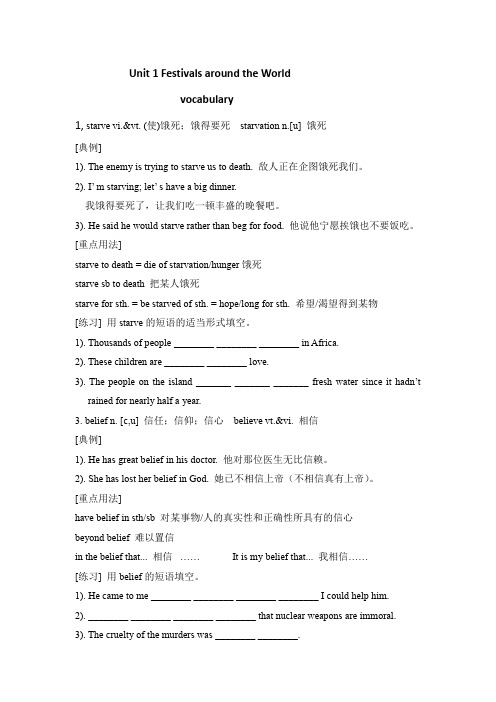
Unit1Festivals around the Worldvocabulary1,starve vi.&vt. (使)饿死;饿得要死starvation n.[u] 饿死[典例]1). The enemy is trying to starve us to death. 敌人正在企图饿死我们。
2). I’ m starving; let’ s have a big dinner.我饿得要死了,让我们吃一顿丰盛的晚餐吧。
3). He said he would starve rather than beg for food. 他说他宁愿挨饿也不要饭吃。
[重点用法]starve to death = die of starvation/hunger饿死starve sb to death 把某人饿死starve for sth. = be starved of sth. = hope/long for sth. 希望/渴望得到某物[练习] 用starve的短语的适当形式填空。
1). Thousands of people ________ ________ ________ in Africa.2). These children are ________ ________ love.3). The people on the island _______ _______ _______ fresh water since it hadn’trained for nearly half a year.3. belief n. [c,u] 信任;信仰;信心believe vt.&vi. 相信[典例]1). He has great belief in his doctor. 他对那位医生无比信赖。
2). She has lost her belief in God. 她已不相信上帝(不相信真有上帝)。
高一语(人教版)-必修三Unit 1 Festivals And Celebrations-教案
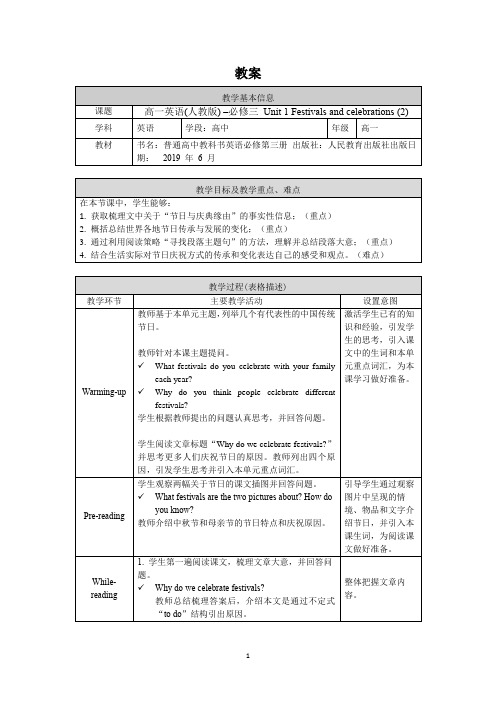
Why do people celebrate the harvest festivals?
What role do customs and traditions play in festivals?
Why did the writer mention the commercialisation offestivals?
学生通过制作思维导图,更好的理解文章的结构特点。
Post-reading
学生结合课文内容和自身生活实际,思考问题,谈论对节日传统文化和节日形式改变的看法。
What do most festivals seem to have in common?
How do you feel about festival customs that have already faded away?
教师针对本课主题提问。
What festivals do you celebrate with your family each year?
Why do you think people celebrate different festivals?
学生根据教师提出的问题认真思考,并回答问题。
学生阅读文章标题“Why do we celebrate festivals?”并思考更多人们庆祝节日的原因。教师列出四个原因,引发学生思考并引入本单元重点词汇。
引导学生通过观察图片中呈现的情境、物品和文字介绍节日,并引入本课生词,为阅读课文做好准备。
While-reading
1.学生第一遍阅读课文,梳理文章大意,并回答问题。
Why do we celebrate festivals?
人教版高中英语必修三Unit1Festivalsaroundtheworld单元教案

Festival around the world单元教案人教版新课标必修3 unit 1教材分析和教材重组教材分析本单元以节日为话题,介绍了世界各地的一些节日、含义、由来和风俗。
通过本单元的学习,可以帮忙学生更多地了解节日、体味文化;同时又能教育学生理解、尊重不同的文化和习俗。
通过本单元的语言技术训练,要求学生学会利用请求和感激的表达法。
1. Warming Up 要求学生以小组形式完成一个表格填充,列出中国的五个节日和这些节日的时间、庆贺的内容和节日里人们的所作所为。
激发学生的阅读兴趣,为本单元Reading 部份的世界节日做好铺垫。
2. Pre-reading 通过若干个问题了解学生对节日的熟悉,比如:你最喜欢的节日是什么?你喜欢与家人仍是与朋友共度佳节?你喜欢节日的哪部份——音乐、造访朋友,可看的仍是可吃的?3. Reading 由五篇小短文组成,别离介绍古代节日、亡灵节、纪念名人的节日、丰收节和春天的节日等,使学生了解节日的由来及其存在的意义。
最古老的节日主要庆贺冬季的结束,春天的播种,秋季的收获等。
鬼节是为祭祀亡灵,取悦先人而举行的节日,例如日本的盂兰盆节(Obon),墨西哥的亡灵节,万圣节(Halloween)等。
纪念名人的节日有中国的端午节,美国的哥伦布日,印度的甘地纪念日。
春天的节日包括中国的春节,西方的狂欢节、复活节,日本的樱花节。
4. Comprehendi ng 第一部份提出的6个问题让学生对所读文章有一个浅层理解。
第二部份要求学生讨论哪些节日是最重要的,哪些是最有趣的,结合所读文章和自己的想法填表。
第三部份要求找出各个节日中共有的三件事,然后与同伴讨论为何这些事情对各地的人们都是重要的。
这一任务不仅使学生重温所读文章的内容,而且结合他们的实际,给学生机缘论述自己的想法和观点,挖掘学生的思维潜力。
这3个练习的设置由表及里,由浅入深,超级科学。
5. Learning about Language 主要突出本单元的重点辞汇和主要语法项目。
人教版高一英语必修3 Unit 1 Festivals around the world 教案

Unit 1 Festivals around the world1.be meant to 应该做某事(尤因某人的吩咐或职责);意在做某事be meant for 为某人/某目的而准备的,打算作……用mean doing 意味着做某事mean to do 打算做某事mean to have done sth 本打算做某事(但实际未做)means n.方法,手段(单、复数同形) by all means 当然可以by means of 用,依靠by no means 绝不,一点也不(置于句首时句子要倒装)(1)I think the police are meant to protect people.(2)Missing this train means waiting for another hour.(3)I meant to give you this book today, but I forgot.(4)Its streets were never meant for heavy traffic.(5)I was meant to listen to the deeds of Tu Youyou,but I was too busy then.(6)I was meant to be working on Sunday,but I just fooled around(闲逛,游手好闲) all day.(7)Why don’t you tell Anna the truth? I meant to have.But I was lacking in the courage.(8)I escaped by means of a secret tunnel.(通道,隧道)(9)By no means is it true that all English people know their own language well.2.celebrate v.庆祝celebration n.庆祝;祝贺in celebration of 为……举行庆祝活动辨析celebrate后面接物congratulate后面接人(1)They had a party to celebrate their parents’ silver weddi ng.(2)On Octobet 1st all the Chinese people hold great parties in celebration of the birthday of New China.(3)She congratulated himself on her narrow escape.3.take place 发生同义词或词组happen break out come out (没有被动语态) 表示代替的短语take the place of… in place of…take one’s place代替某人;就座take (the) first place居首位,得第一(1)Great changes have taken place in China in the last few years.(2)Terrible diseases broke out after the flood here.(3)Nowadays plastics have taken the place of many materials.(4)Mr.Wang is ill, so she takes his place as our teacher.(5)Some persons think that robots will take the place of human beings.4.starve vt. vi.(使)饿死,饿得要死starve for sth极需要/渴望某物starve to do sth渴望做某事starve to death饿得要死be starved of= be starved for be starving=be starved starvation n.挨饿,饿死(1)Millions of people starved to death during the war,because the harvest was hard to get in.(2)The woman is starving herself trying to lose weight.(3)The people in the disaster area are starving for medicine.(4)When will the dinner be ready? I am starving.(5)1.5 million people are in immediate danger of death from starvation.5.satisfy vt. vi 使满意,满足satisfied adj. satisfying adj.令人满意的satisfaction n. satisfactory adj. 令人满意的,圆满的(1)Cheap goods are available, but not in enough quantities to satisfy demand.(2)The procedures should satisfy certain basic requirements.(3)We are satisfied with what he said.(4)What he did is really satisfying.(5)She never could seem to do anything right or to his satisfaction.(6)The result of the experiment is satisfactory.6.harm n.危害;伤害;损害do sb/sthharm=do harm to sb/sth 对某人/某物有害harmful adj.有害的harmless adj.无害的;无恶意的harmlessly adv.(1)All dogs are capable of doing harm to human beings.(2)The hijackers seemed anxious not to harm anyone.(3)It is obvious that smoking is harmful to health..(4)These vegetables are harmless.7.in memory of 纪念,追念in honour of in need of in case of in search of in face of(1)On September 3,China held a massive military parade in honour of the70th anniversary of its victory in the Chinese People’s War of Resistance against Japanese Aggression and the World Anti-Fascist War.(2)Ring the alarm in case of fire.(3)This man went in search of a doctor for his sick wife.(4)The roof of this house is in need of repair.(5)You should keep calm even in face of danger.8.offer vt.奉献;供奉;提出;表示;给予;提供;出价;开价;提供消费;主动提出要做某事(1)They offered a sheep to God.(2)He offered an opinion to me yesterday.(3)I offered him a glass of wine.(4)The house price is falling now, so I offer him the house for 800$.(5)She offered to carry the box for her mother.9.belief n. 相信;信心;信任;信念;信仰beyond belief 难以置信;believe vt.相信vi.相信;信任后接介词in(1)I have no belief in what he said.(2) I believe what he says.(3)I believe him to be right.(4)I believe you, but I don’t believe in you.10.dress up盛装,打扮;装饰dress sb up 打扮某人;dress sth up 装饰/掩饰某物dress up as…装扮成……dress sb/oneself 给某人/自己穿衣服dress for…为……穿好衣服be/get dressed in…穿着……的衣服(1)He was going to lend me a suit so that I could dress up for the party.(2)Little girls dress up as angles for fiestas.(宗教节日)(3)The little boy isn’t old enough to dress himself.(4)She asked me to dress for her during the party.(5)He is dressed in white at night; as a result, I look up him as a ghost.11.trick n. 诡计;恶作剧;窍门vt.欺骗;诈骗play a trick/tricks on sb ; play a joke on/with sb ; make a fool of; laugh at;make fun of(1)It’s an old trick but it just might work.(2)Watching the naughty boy, she was going to play a trick on him.(3)His family tricked him going to Pakistan.(4)The teacher likes to play a joke with me.(5)If you wish to make a fool of yourself, that is your affair.(6)You’re a sport(开朗大度的人) to laugh at the trick we played on you.(7)The other children always make fun of him because he is fat.12.arrival n. 到来;到达;到达者arrive vi.到达;来到;出生(1)The secretary informed me of his arrival.(2)We were tired when we arrived home.(3)At last,summer has arrived.(4)Her baby arrived yesterday.13.gain vt.获得;得到钟表走得快;增加n.增加;收益;好处;收入(1)He gained high grades in English and maths.(2)You will gain lessons from the failure.(3)The clock gains five minutes.(4)She recently gains 10 kg in weight.(5)A fall into a pit(坑), a gain in your wit(智慧).(6)No pains, no gains.14. gather v.集合;聚集;搜集;收集是普通用语,指把分散的东西集中在一起,主要是为了使用,如收集粮食、树叶、花草等。
人教版英语必修三Unit 1(Using language:A Sad love Story)教案设计

Book3 Unit1 Festivals around the World教案设计Period 5 Using Language (A Sad Love Story)一、教学背景(Teaching background)1. 面向学生:高一学生2. 学科:英语3. 课时:14. 学生课前准备:①了解“七夕”节日来源②预习课文及相关词汇二、教材分析(Analysis of the text)本课“A Sad Love Story”把“七夕”牛郎织女的故事与现代李芳、胡瑾的故事结合,两个故事相映衬、对比,融为一篇文章。
不仅让我们了解了传统节日的来源,通过对比古代爱情及现代爱情,更可引出更深的思索。
教学重点:1. 让学生了解“七夕”的起源。
2. 通过阅读,理解李芳、胡瑾故事教学难点:1. 弄清李芳、胡瑾两人没碰面的原因2. 对比牛郎织女故事及上述两人故事,思考爱情、信任等感情三、教学方法(Teaching methods)1. 在教学过程中,突出学生的主体地位,指导学生弄清两个故事情节发展,并对其中情感进行思考、讨论2. 教学辅助手段:多媒体教学。
四、教学过程(Teaching procedures)Step 1 Leading inAsk the students to look at the title and the picture, and then guess what the passage is about.设计说明:该步骤旨在引导学生锻炼观察力及发挥想象力,为进行更深入阅读打好基础。
Step 2 Reading comprehension1. Read the passage2. Fill in the blanksNiu Lang and Zhi Nv’s storyIntroduction The _______ of the Goddess of Heaven — Zhi Nv visited the earth.Development She met the ______ boy – Niu Lang. They _____ ______ ______ and got ______. Climax The Goddess of Heaven made Zhi Nv ______ to Heaven. Although Niulang tried to follow, the ______ _______ stopped him.Ending They were allowed to meet ______ _____ _____ on a bridge make by _______.Li Fang and Hu Jin’s storyIntroduction Li Fang waited for Hu Jin in a _______ shop, but she didn’t ______ _______. Development Li Fang watched the story about Niu Lang and Zhi Nv on TV.Climax He ______ ______ the presents, and came across Hu Jin, who waited for him in a ______ shop.Ending ?3. Question: Why they didn’t meet?设计说明:1. 让学生自己阅读课文,掌握大意,获取信息。
人教版英语必修三Unit 1(Reading)教学教案.doc

人教新课标英语必修三第一单元教案Unit 1Festivals around the WorldReading 教案Teaching goals1.To get the students to talk about festivals2.To learn about how festivals begin and how to celebrate festivals so as to enable them to learn more about different cultures while learning different language3.To develop the students’ reading skills : skimming, scanning, summarizing, and finding out details.4.To arouse the students’ interest in festivals, cultures, especially those in China,thus promote their culture awareness.Important pointsprehension of the reading part.2.Knowledge accumulation of festivals and cultures.eful words and expressions concerning festivals.Teaching aidsA computer, a projector, courseware, a tape-recorderTeaching proceduresStep 1 revisionRevise the festivals.Step 2 pre-readingWhat is your favourite holiday of the year? Why?Step 3 fast reading1.How many kinds of festivals are mentioned in the text? What are they?2. let’s get to know more about these festivals and fill in the form on P3.Ex1Step 4 careful readingParagraph 1:When did ancient people celebrate ?•at the end of winter•When good weather returned• a good harvest•animals caughtParagraph 2: Festivals of the dead1.What are festivals of the dead for?2. How do Japanese honour their ancestors?3. What do the people in Mexico do in memory of the dead?*Are there any similar festivals in China? What do do? What to eat?The Qingming FestivalParagraph 3: Festivals to honour peopleParagraph 4:Harvest Festivals1) Why are autumn festivals happy events?Because people are grateful and happy and a season of agricultural work is over.2) What do people do to celebrate it?In European countries, it is the custom to decorate churches and town halls with flowers and fruit; get together to have meals, win awards for their animals, flowers, fruit and vegetables; admire the moon Paragraph 5: Spring FestivalsParagraph 6: What are the purposes of festivals?Festivals: To have fun with each other / To let us enjoy life/ To be proud of our custom/ To forget our daily life for a little while/To honour the dead/To honour famous people/To celebrate harvest/To welcome a new year and look forward to the future/To ask people to pay attention to somethingStep 5 post readingDo T or F(1). The ancient people needn’t worry about their food. F(2). Halloween used to be a festival intended to honor the dead. T(3). Qu Y uan was a great poet whom people honor a lot in China. T(4). Mid-autumn Festival is held to celebrate the end of autumn. F(5). Easter celebrates the birth of Jesus. F(6). There is pink snow in spring in Japan. FStep 6 Group workFestivals are created. Now you’ve got the chance to create a new festival. Discuss in groups, make a plan:When the festival takes placeWhat the festival is forWhat people do at the festivalWhat people eat at the festivalSample: Peace DayIt takes place every year on January 2, the day after the New Year’s Day. At the beginning of a new year, we create such a festival in order to call for peace, to make the world a better place for everyone. People have to learn about foreign countries on that day. The TVs and newspapers will be all about foreign countries. And people are asked to eat foreign food on that day. And they are asked to talk about peace with their families, friends, and so on.HomeworkWrite an introduction of the festival your group have created.。
人教版高中英语必修三Unit1Readingforstructure教学设计全面版
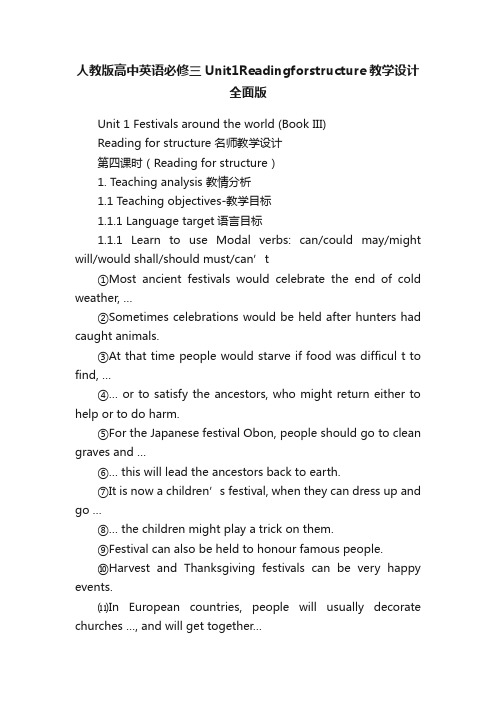
人教版高中英语必修三Unit1Readingforstructure教学设计全面版Unit 1 Festivals around the world (Book III)Reading for structure 名师教学设计第四课时(Reading for structure)1. Teaching analysis 教情分析1.1 Teaching objectives-教学目标1.1.1 Language target语言目标1.1.1 Learn to use Modal verbs: can/could may/might will/would shall/should must/can’t①Most ancient festivals would celebrate the end of cold weather, …②Sometimes celebrations would be held after hunters had caught animals.③At that time people would starve if food was difficul t to find, …④… or to satisfy the ancestors, who might return either to help or to do harm.⑤For the Japanese festival Obon, people should go to clean graves and …⑥… this will lead the anc estors back to earth.⑦It is now a children’s festival, when they can dress up and go …⑧… the children might play a trick on them.⑨Festival can also be held to honour famous people.⑩Harvest and Thanksgiving festivals can be very happy events.⑾In European countries, people will usually decorate churches …, and will get together…⑿Some people might win awards for their farm produce, …⒀At the spring festival in China, p eople … and may give children luck money in red paper.⒁These festivals might in clude parades, dancing in the streets …⒂The teacher said that we could not leave early. P5⒃The hunters are lost. They could starve. P5⒄It was Valentine’s Day and Hu Jin had said she would meet him at the coffee shop after work. P7⒅She could be with her friends right now laughing at him. P7⒆She said she would be there at seven o’clock, and he thought she would keep her word. P7⒇He would drown his sadness in coffee. P7(21) “We could be like that,” thought Li Fang. P7(22) Magpies make a bridge of their wings so the couple can cross the river to meet on the seventh day of the seventh lunar month. P7(23) It’s a fine day today, so I hope you can all meet the one you love. P7(24) What would he do? … She would never forgive him. This would not be a happy V alentine’s Day! P71.1.2 Talk about the ways to express request and thanks1.1.2.1 Express one’s opinion:①In my opinion, ... ②I believe ... ③I think that ...1.1.2.2 Express request:①Could/ Would you please…? ②Coul d I have…?③Could we look at…? ④I look forward to…⑤May I see…?1.1.2.3 Making phone calls打电话①May I speak to …? ②Can I ring/call back later?③Hold/Hang on, please. ④I’ll ring him/her up again.⑤Just a moment, please. ⑥Sorry, he/she isn’t here right now.1.1.2.4 Invitations 邀请①I wonder if you are interested in … ②I’d like to invite you to …③Would you like …? ④Could/Would you please …?⑤I’m looking forward to … ⑥I’d love/like to, but …1.1.2.5 Thanks 感谢①Thank you so much. ②Thanks (a lot).③That’s very kind of you. ④You’re (most) welcome.⑤Don’t mention it. ⑥It’s a pleasure./My pleasure.1.2 Ability goals能力目标Comprehend and properly use modal verbs1.3 Emotion goals 情感目标Properly use modal verbs to express one’s own feelings1.4 Important & difficult teaching points-教学重难点1.4.1 Important teaching points-教学重点①The use of Modal verbs②The way to express invitations, request and thanks1.4.2 Difficult teaching points-教学难点The use of modal verbs in expressing invitations and request2. Student analysis学情分析2.1 Fundamental state基本情况学生在初中及高一上期已经多次接触和理解,甚至运用过情态动词,因此对情态动词的用法已比较熟悉。
人教版英语必修三-Unit-1-全单元教案

Unit 1 Festivals around the worldI.教学内容分析本单元的中心话题是“节日”,主要讲述了不同地区不同种类的节日。
Warming Up部分设计了小组活动,通过图表填写让学生区分中国的传统节日与别国节日的异同,目的在于激活学生已有的节日背景知识,引出主题,为以后几堂课学习热身。
Pre-readin g 通过几个问题,调动学生已有的知识和经验,激发学生想了解更多节日的好奇心,让他们主动参与到主题教学活动中,为下面学习阅读文章作铺垫。
Reading 部分先简要介绍了一下早期各种节日的起源以及存在的原因,然后又分别介绍了几种世界各地的节日,依次的顺序是亡灵节、纪念名人的节日、丰收节、春天的节日等。
Comprehending由四个部分组成。
第一、三、四部分通过表格形式,第二部分通过让学生回答问题的方式,鼓励学生积极思考,加深对课文的理解。
Learning about Language 部分主要突出了本单元的语法项目——情态动词的用法。
这些情态动词主要有:can,could,may,might,will,would,shall,should,must,can’t 等的用法。
Using Language 部分中包括了听、说、读、写几个部分的内容。
学生可通过对Trinidad Carnival、情人节等一些节日的学习,分析问题,锻炼自己的思维能力。
阅读后的习题及讨论不仅帮助学生理解文章的主旨大意,更重要的是让学生寻找解决问题的方法。
Learning Tip部分主要建议学生搜集各种资料,查询与世界各地节日有关的信息,了解各种节日的来源与内涵。
II.教学重点和难点1. 教学重点(1) 本单元的生词和短语;(2) 掌握一些情态动词的基本用法;(3) 了解有关节日和民俗,掌握有关词汇,如custom,religious等。
2. 教学难点(1) 增进学生对中国节日的理解,了解和感悟外国的节日;(2) 提高学生的社会文化素质,加强跨国文化素质;(3) 培养学生运用资源策略。
人教版高一英语必修3unit1教案教学设计

Unit 1 Festivals around the world学科:English 授课班级:Senior One 执教教师:授课时间:15/2旁注III. 教材分析与教材重组1. 教材分析本单元以节日为话题,介绍古今中外节日的种类、由来、意义以及人们的活动和习俗,旨在通过本单元的学习使学生不但了解我国的节日,而且对外国的节日也有所了解,进而拓展社会文化背景、增加跨国文化知识;使学生复习和巩固运用请求和感谢的表达法,掌握情态动词的用法;并尝试根据阅读的文章写一个不同的结局,能表达自己的观点和想法。
1.1 Warming Up 旨在通过表格引导学生讨论并列举出五个我国节日的日期、庆祝内容和民俗。
可以刚刚过去的春节为话题导入对节日的讨论;使他们由自己的经历谈起,扩展到别的节日以及外国的重要节日,激发学生的兴趣,激活他们关于节日的背景知识,为本单元的学习做准备。
1.2 Pre-reading是Reading 的热身活动。
主要通过两个问题引导学生思考并讨论自己最喜欢的节日及欢度方式,进而了解学生对节日的认识,以便为阅读作好铺垫。
1.3 Reading 的五篇小短文分别介绍古代节日、亡灵节、纪念名人的节日、丰收节、春天的节日等,使学生了解各种节日的由来及其存在的意义。
此部分载有Festivals的重要信息,还呈现了大量的词汇和主要的语法---情态动词的用法。
处理时应作为重点、整体处理,通过上下文来教词汇、语法,并引导学生分析长句、难句和复杂句。
1.4 Comprehending是考察对阅读内容的进一步理解。
练习一:六个问题让学生对文章内容有浅层理解并考察课文细节,但又不能仅仅拘泥于课文,要引导学生理解课文内容的基础上联系现实生活。
练习二:要求学生讨论哪些节日是最重要的,哪些是最有趣的,以表格的形式检查学生对所读节日的理解,并训练他们举一反三的归纳和推理能力。
练习三:要求学生找出各种节日共有的三件事,然后讨论为什么这些事对各地的人们都很重要。
人教版高中英语必修三Unit1ListeningandSpeaking教学设计全面版
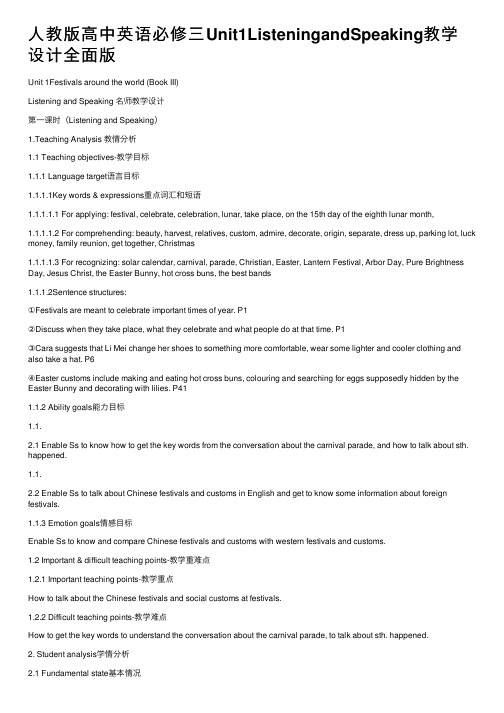
⼈教版⾼中英语必修三Unit1ListeningandSpeaking教学设计全⾯版Unit 1Festivals around the world (Book III)Listening and Speaking 名师教学设计第⼀课时(Listening and Speaking)1.Teaching Analysis 教情分析1.1 Teaching objectives-教学⽬标1.1.1 Language target语⾔⽬标1.1.1.1Key words & expressions重点词汇和短语1.1.1.1.1 For applying: festival, celebrate, celebration, lunar, take place, on the 15th day of the eighth lunar month,1.1.1.1.2 For comprehending: beauty, harvest, relatives, custom, admire, decorate, origin, separate, dress up, parking lot, luck money, family reunion, get together, Christmas1.1.1.1.3 For recognizing: solar calendar, carnival, parade, Christian, Easter, Lantern Festival, Arbor Day, Pure Brightness Day, Jesus Christ, the Easter Bunny, hot cross buns, the best bands1.1.1.2Sentence structures:①Festivals are meant to celebrate important times of year. P1②Discuss when they take place, what they celebrate and what people do at that time. P1③Cara suggests that Li Mei change her shoes to something more comfortable, wear some lighter and cooler clothing and also take a hat. P6④Easter customs include making and eating hot cross buns, colouring and searching for eggs supposedly hidden by the Easter Bunny and decorating with lilies. P411.1.2 Ability goals能⼒⽬标1.1.2.1 Enable Ss to know how to get the key words from the conversation about the carnival parade, and how to talk about sth. happened.1.1.2.2 Enable Ss to talk about Chinese festivals and customs in English and get to know some information about foreign festivals.1.1.3 Emotion goals情感⽬标Enable Ss to know and compare Chinese festivals and customs with western festivals and customs.1.2 Important & difficult teaching points-教学重难点1.2.1 Important teaching points-教学重点How to talk about the Chinese festivals and social customs at festivals.1.2.2 Difficult teaching points-教学难点How to get the key words to understand the conversation about the carnival parade, to talk about sth. happened.2. Student analysis学情分析2.1 Fundamental state基本情况本单元的教学应为⾼⼀下期内容,学⽣已通过⼀个学期的⾼中学习,理应对⾼中学习的要求基本明⽩,并已基本适应⾼中学习,具备⾼中学习的基本技能,初步掌握⼀些学习策略,只是经过寒假的冲击,需要重新进⾏学习习惯和学习策略的强化。
人教版高一英语必修三Unit1Festivals around the world教案(1)
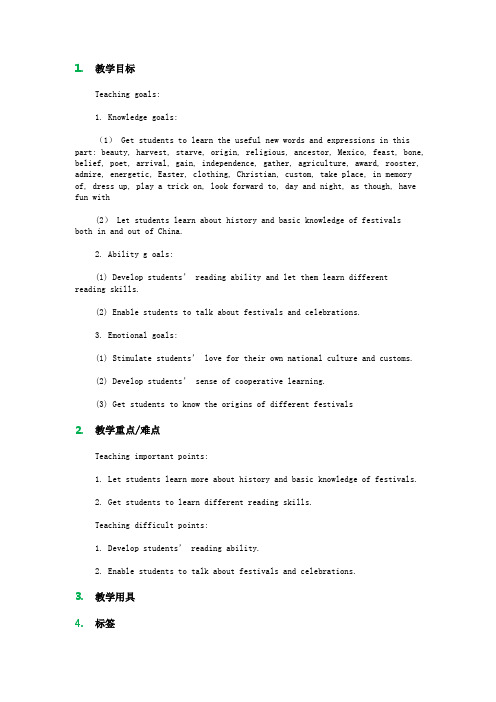
1. 教学目标Teaching goals:1. Knowledge goals:(1) Get students to learn the useful new words and expressions in this part: beauty, harvest, starve, origin, religious, ancestor, Mexico, feast, bone, belief, poet, arrival, gain, independence, gather, agriculture, award, rooster, admire, energetic, Easter, clothing, Christian, custom, take place, in memory of, dress up, play a trick on, look forward to, day and night, as though, have fun with(2) Let students learn about history and basic knowledge of festivalsboth in and out of China.2. Ability g oals:(1) Develop students’ reading ability and let them learn differentreading skills.(2) Enable students to talk about festivals and celebrations.3. Emotional goals:(1) Stimulate students’ love for their own national culture and customs.(2) Develop students’ sense of cooperative learning.(3) Get students to know the origins of different festivals2. 教学重点/难点Teaching important points:1. Let students learn more about history and basic knowledge of festivals.2. Get students to learn different reading skills.Teaching difficult points:1. Develop students’ reading ability.2. Enable students to talk about festivals and celebrations.3. 教学用具4. 标签教学过程Teaching procedures:Step 1 Lead-inGreet the students and play a joke on them.I will be their new English teacher, do you believe it ?What if I tell you this news on April, 1st, will you believe it? Why?(Lead the students to say out the April Fool’s Day.)Step 2 Warming up1. Let students brainstorm other festivals they k now.(Lantern Festival, Spring Festival, Dragon Boat Festival, Mid-Autumn Festival, Christmas, Valentine’s Day, Thanksgiving Day. . . )1.Whatdo people do at festivals? List the activitiesthey do. Teacher shows thepictures of Spring Festival, Mid-autumn Festival and the Valentine’s Day asexamples.2.3.Step3 Fast Reading 1. Readthe passagequickly to find out what kinds of festivals are mentioned in thispassage.2. Readit again quickly and try tofinish the chart in EX.1 on page 3. Fill in the chart with the namesof festivals and the names of the countries whichcelebrate these festivals.4.5.(Check the answers together)6.Step 4 Careful reading7.Learn each kind of festival one by one, and do some exercise toget a more detailed knowledge of these festivals.8. 1. Festivals of the Dead9.Why do people hold festivals of the Dead? (To honour the deador to satisfy the ancestors.)10.What do people do at these festivals? Match the activities witheach festival.11. Obon in Japan: clean graves, light incense, light lamps, playmusic.12. The Day of the Dead in Mexico: Eat food in the shape ofskulls and cakes wi th “bones”; Offer food, flowers and gifts to the dead13. Halloween in some western countries: dress up; go to theirneighbours to ask for sweets, play tricks14.2. Festivals to Honour People:15.Read this part and then do a match job. Match th e names offestivals with the pictures of the people.16.17.课后习题Homework1. Review the words and expressions in this unit2. Write a short passage about your favorite festival.。
- 1、下载文档前请自行甄别文档内容的完整性,平台不提供额外的编辑、内容补充、找答案等附加服务。
- 2、"仅部分预览"的文档,不可在线预览部分如存在完整性等问题,可反馈申请退款(可完整预览的文档不适用该条件!)。
- 3、如文档侵犯您的权益,请联系客服反馈,我们会尽快为您处理(人工客服工作时间:9:00-18:30)。
教学过程一、课堂导入要求学生以小组形式完成一个表格填充,列出中国的五个节日和这些节日的时间、庆祝的内容以及节日里人们的所作所为。
激发学生的阅读兴趣,为本单元Reading部分的世界节日做好铺垫。
二、复习预习以提问学生方式复习上节课所学习知识。
同时以习题形式预习新课。
三、知识讲解考点/易错点1 重点单词与短语学习mean n.意义,意思v. 意味;想要(回归课本P1)Festivals are meant to celebrate important times of year.[归纳拓展]mean to do 打算做某事be meant to do 被要求做…mean doing 意味着….eg. I never meant him to work for us.Passing the entrance examination means being admitted into college.take place发生(回归课本P1)Discuss when they take place, what they celebrate and what people do at that time. [归纳拓展]take place/happen/occur/break out/come about(1)take place 其“发生”是按意图或计划进行,无偶然性,无被动语态。
(2)happen “发生”,常指具体客观事物或情况的发生,含有“偶然”的意味。
当以具体事物、事件作主语时,happen 和occur 可以换用;但当happen用作“碰巧”之意时,不能用occur代替,但可以与come about 互换。
用法是happen to do sth.,无被动语态。
(3)occur发生,出现, 较正式用语,可指事情偶然地、意外地发生或思想突然浮在心头。
occur to 有“想起”的意思。
指具体事物时可与happen互换(但happen to do不可换成occur to do);另外occur 有“突然想起”的意思,此时不可与happen 互换,如A good idea occurred to him.(4)break out (战争、火灾等)爆发;(疾病)突然发生。
无被动语态。
(5)come about “发生,产生”,常指偶然发生的事情。
指要解释或说明事情发生的理由,且很多时候与how 连用。
In 1919, the May 4th Movement took place in China. 1919年,中国爆发了五四运动。
It happened to rain that day. 那天恰好下雨。
The traffic accident occurred on Wednesday.How does it come about that you were caught by the police? 你怎么会被警察抓去的?dress up打扮(回归课本P2)It is now a children’s festival, when they can dress up and go to their neighbors’homes to ask for sweets.[归纳拓展]dress up 盛装;打扮;装饰dress sb./oneself 给……穿衣服;打扮be/get dressed in+(衣服或表颜色的词) 穿着……dress+adv.(或表目的、场合的介词短语) 穿着……区别:dress/wear/put on/have on(1)dress是动作动词,表示“给(人)穿衣/打扮”,后面的宾语是表示人的名词。
常见的用法有dress sb./oneself, be dressed(in), dress well/quickly等。
(2)wear是状态动词,表示“穿戴、佩戴(手表、首饰、花等),留(发型、胡须)等”;还可表示“面露、面带(某种表情、样子等)”,意义广泛。
(3)put on是动作动词,表示“穿(衣)戴(帽)”,后面的宾语是表示衣服等的名词。
(4)have on是状态动词短语,除了表示“穿着,戴着”之外,还可表示树木等“披着,挂着”,不用进行时态。
gain n. 增加;利润;收获vt. 获得;增加;赚到vi. 增加;获利(回归课本P2)India has a national festival on October 2 to honor Mohandsa Candhi, the leader who helped gain India`s independence from Britain.[归纳拓展] gain/acquire/earn/achieve(1)gain 收获;获得。
指获得有用或必需的东西。
可以用于体重、力量的增加,奖学金的获得,更常用于经验、知识、教育、满足等的获得。
(2)acquire 购得,得到(尤指昂贵的或难以得到的东西);获得,掌握(知识、技能等)。
(3)earn 取得;赚得。
通常指通过工作挣钱,也可以用于应该得到的东西,如支持、认同、声望或尊敬。
(4)achieve 得到,获得。
多指成就、目标、幸福的取得。
award vt. 颁奖,授奖,给予n.奖,奖品,奖状(回归课本P2)Some people might win awards for their farm produce,like the biggest watermelon or the most handsome rooster.有些人还可能因为他们的农产品(参加各种评选)而获奖,比如最大的西瓜或最帅的公鸡。
[归纳拓展]award sb. sth./sth. to sb. 授予某人某物be awarded for... 因……而受奖win/receive/get an award for 因……而获奖①He was awarded a medal for bravery.②The Olympic winner received a gold medal as an award.③How can I reward your help?=How can I reward you for your help?区别: award, reward, prize, medalaward: 指因成绩或贡献由政府或组织颁发的“奖”获“奖金”。
reward: 意为回报,报酬,报应,酬劳。
prize: 奖品,奖金,战利品,捕获物。
medal: 奖章,勋章,纪念章,如金牌,银牌。
admire vt. 赞美;钦佩;羡慕(回归课本P2)China and Japan have M idAutumn festivals,when people admire the moon and in China,enjoy mooncakes.中国和日本都有中秋节,这时,人们会赏月。
在中国,人们还品尝月饼。
[归纳拓展]admiration n. 赞美,钦佩admirable adj. 可饮佩的,极佳的admiring adj. 赞赏的,羡慕的admire sb. for sth. 因某事而钦佩某人have admiration for sb./sth. 羡慕/钦佩某人/物watch/gaze in admiration 赞赏地观看/凝视着①The school is widely admired for its excellent teaching. (be admired for)这所学校教学优秀,远近称誉。
②You have to admire the way he handled the situation.你不得不佩服他处理这个局面的手段。
③I am filled with admiration for his courage.=I have admiration for his courage. 我对他的勇气十分钦佩。
in memory of纪念;追念(回归课本P2)For the Japanese festival Obon,people should go to clean graves and light incense in memory of their ancestors.在日本的盂兰盆节,人们要上坟扫墓、烧香,以缅怀祖先。
①A film will be made in memory of those brave firefighters.为了纪念那些勇敢的消防战士,一部电影即将开拍。
②She has an excellent memory for names,which helps her quite a lot in her work. 她对名字有极佳的记忆力,这对她的工作很有帮助。
③The life in the countryside has become a distant memory.那段乡村生活已成为遥远的记忆。
[归纳拓展]in+n.+of 短语in praise of 歌颂in honor of 纪念;为向……表示敬意in favor of 赞同in support of 支持in charge of 负责in search of 寻找in possession of 拥有in need/want of需要in place of 代替in hope of 希望set off出发;动身;使爆炸;引起(回归课本P7)At 10 o’clock we set off for our homeland. Two hours later we arrived at the city located on the coast. On the street decorated with festival gifts and all kinds of flowers some children were setting off fireworks. The Spring Festival set off a wave of sales in every shop. People everywhere were cheering up.[归纳拓展]set off 出发;动身;使爆炸;引起set out 动身;出发;着手set aside 把……放到一边;储蓄be set in 以……为背景set about 着手;开始turn up出现,到场;开大,调高;被发现(回归课本P7)But she didn’t turn up.可她却不见人影。
①Once he turned up thirty minutes late for a meeting!曾经有一次他到达会议时已迟到30分钟!②I’ll turn the television on.我来打开电视机。
